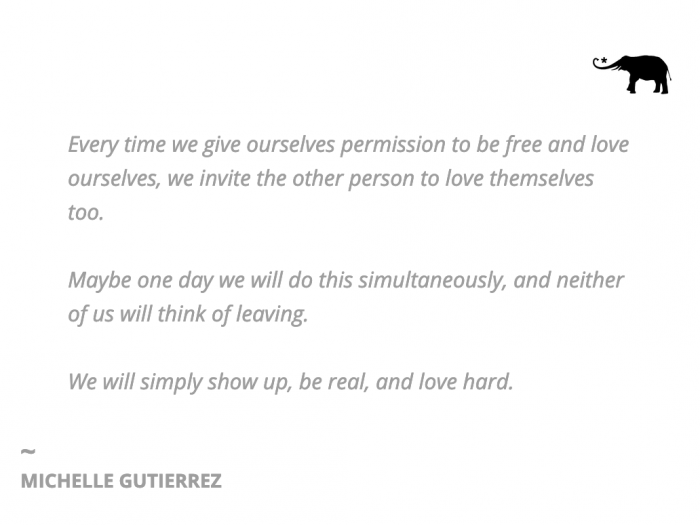View this post on Instagram
“I do love you, but something has changed.”
“You were different before; I really liked that person.”
How many times have we heard this expression? It arrives in different ways, but the sentiment is the same.
Correction: I didn’t change. You just haven’t seen all my demons and different personalities. I haven’t yet introduced you to the real me.
I have played the miss-perfect-bombshell, sexy, and understanding girlfriend for so long that I feel a master at it, but after some time, it becomes boring. I end up opening Pandora’s box to my unpolished feelings and wild behaviors.
~
One of the most important things you can do for your vagina and your sex life—to avoid a world of problems later? Check out this device and get a free bag of craft coffee (code; EJCOFFEE)>>
~
When I was young, it was easy to hide inside these different characters. But the cost of doing that was really high.
I hated myself; I felt disappointed in myself for letting me down for not standing up for myself and what I believe in. The judge in me would reprimand me for all I had to improve and how imperfect I continued to be despite the efforts.
I remember many years ago going into a circus, back when I wouldn’t even question the animals’ lives and how they were treated, but that is a different story. I recall sitting there watching some clowns being joyful and silly. I felt like them—painting a huge, red, fake smile on my face, while on the inside, I wanted to cry and simply not smile. I wanted to stop playing the part.
Our adult behaviors and how we react to situations, how we connect with other people in relationships result from our upbringing—what we have learned from others and how we were treated. As an adult, I felt like I was making my own way, and I was, but I was making it with patterns and behaviors that served the people who raised me. They weren’t serving me. This way of thinking served them; they lived in different times—different circumstances.
I know when we met someone, we want them to see the best of us. It is not like we show up to dinner dates in our pj’s ready to show our worst behavior, yawning if we are actually bored, pouting if the dinner is not what we expected, and saying, “Do me in the table. It’s my fantasy.”
We stand there wearing our hearts on our sleeves—bleeding and scared from previous battles and experiences—hopeful to believe in love again.
So, where is that fine line between wanting to show our “best” self and only sharing our Instagrammable side?
We can start finding it by getting to know ourselves. Who the heavens are we?
We can ask ourselves what is it about ourselves that we haven’t learned how to love—that we feel we must hide from others—and why?
I know it may sound odd, but when we ask ourselves these questions and our truest self replies inside our minds and hearts, it gives a feeling that only we can understand.
We fear others will judge us and not accept who we are because, let’s get real, we all judge.
We don’t accept everything we are, so we believe others will feel the same way.
We don’t need to play a part. (As the word says, it’s a “part.”) We are complete, whole, beautiful as we are. We are brave, yes, but we can also be cowardly. We are kind and giving, yet we also can be selfish and judgemental.
To see our darkness is to see we are fear, laziness, apathy, judgment, sadness, anger, and emptiness. These are human emotions that complement our light, joy, hopefulness, kindness, loving, courage, and wholeness.
We are in search of our better side, dividing ourselves into good and bad, interesting and boring, black and white. We are human. We are meant to love one another not for the character they can play but for who they really are. Just as we wish to be loved and accepted as we are.
If during our childhood we suffered abandonment, we learned that to be loved, we had to be the best—be quiet, agreeable, smiling, and pretend uncomfortable emotions didn’t exist unless they were lovable ones.
We might want to be our “best” to be loved, but we could also be using this to confirm our fear born from abandonment. To reassure ourselves subconsciously that we are right, and people will leave us, not if but once they see who we truly are.
It is fascinating to be able to see that everything has a reason as to why we do what we do and act as we act. When our wound of abandonment gets triggered, our defense mechanism is to protect ourselves from what we know is coming.
If we believe, deep inside, that a person will leave us, we push that person away first. We play “the part”—so they can see and confirm how “imperfect” and “difficult” we are. We leave (because sooner is better than later). We end up abandoning them and doing the very thing we are afraid will happen to us.
When this happens, it is like our brain relaxes and says:
“I told you so! Now we can be ourselves…until the next person comes. Then we’ll hide all of our demons under the carpet again. At least until we want that person to leave already. We will be a step ahead—protecting our lonely hearts.”
I am waiting for them to see me—all that I am—so they can leave. And I will pretend I don’t care because, like the song says, the best is yet to come.
We don’t need a cure or a specific ritual to overcome these types of wounds. Accepting who we are and loving who we are is a process that doesn’t end. But it does get better. The more honest we can be with ourselves, the more honest we can be with others.
These patterns and learned behaviors maybe can’t be unlearned and completely forgotten, but we can learn new behaviors that go with the type of relationship we want to have, and that goes for sure with the type of person we want to be. A wild and free spirit. A beautiful lioness, unafraid to live fully, love hard, and rejoice in this epic, sometimes sad, sometimes magical, life.
Accepting who we are can look like staring ourselves in the eyes in front of the mirror and giving ourselves a kind smile, thankful for who we are, what we have been through, and everything we see in front of us—reflecting life.
Naming and acknowledging our feelings is a beautiful first step to change the pattern of instantly putting on a mask when we feel uncomfortable. If we feel frustrated, let’s just say it!
We can choose to understand why and eventually let go of this feeling. We let ourselves feel it; we give it space. If we feel fearful, we can say, “I am feeling fearful.” We can hold fear’s hand and walk with it rather than slapping it away.
Let’s burn all the masks we have in the closet and show that dinner date our whole, genuine selves, wearing confidence on our true skin.
So what if someone leaves? We can’t control others or what will happen. But we sure f*cking can be true to ourselves and have a blast loving hard and living free.
Truth has always been your best color. And realness is the best perfume.
Ready to join?
Hey, thanks so much for reading! Elephant offers 1 article every month for free.
If you want more, grab a subscription for unlimited reads for $5/year (normally, it's $108/year, and the discount ends soon).
And clearly you appreciate mindfulness with a sense of humor and integrity! Why not join the Elephant community, become an Elephriend?
Your investment will help Elephant Journal invest in our editors and writers who promote your values to create the change you want to see in your world!
Already have an account? Log in.
Ready to join?
Hey, thanks so much for reading! Elephant offers 1 article every month for free.
If you want more, grab a subscription for unlimited reads for $5/year (normally, it's $108/year, and the discount ends soon).
And clearly you appreciate mindfulness with a sense of humor and integrity! Why not join the Elephant community, become an Elephriend?
Your investment will help Elephant Journal invest in our editors and writers who promote your values to create the change you want to see in your world!
Already have an account? Log in.

 Share on bsky
Share on bsky







Read 16 comments and reply